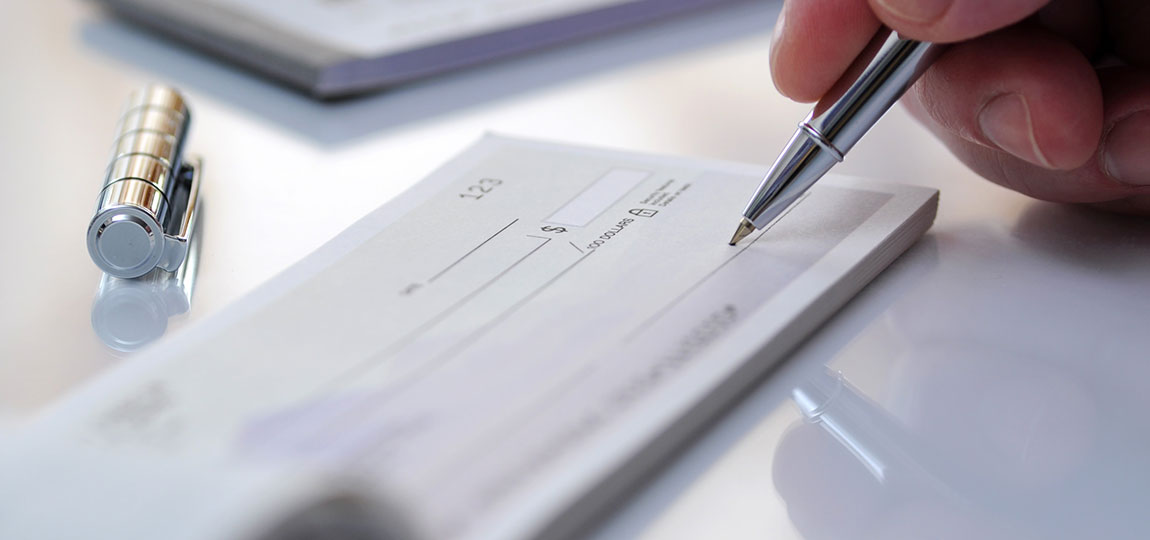There was a time when people didn’t give a second thought to paying their bills by check and sending them out via postal mail. But with all the fraud going on in the world today, you may be wondering just how safe those paper checks really are.
The truth is that checks can pose a host of problems from a security standpoint. For one, the front of a check typically contains an abundance of sensitive information such as name, address, financial institution, routing number, and bank account number – quite the payload for a crook.
To make matters worse, there are some retailers and government entities that require you to write your driver’s license number or Social Security number on a check before they will accept it. And after the check is handed over, there’s no telling how many employees could have access to that information.
If your check falls into the hands of someone who isn’t trustworthy, it could open a Pandora’s Box down the road, including identity theft and account takeover. Just by having the account and routing numbers, thieves can go on an online spending spree.
And even if you limit your check writing to just paying a few bills by postal mail each month, there’s still a possibility that your mail could be intercepted along the way. According to the United States Postal Inspection Service, in an average year it responds to more than 27,000 consumer fraud complaints, including reports of identity theft. And, it arrests around 10,000 criminal suspects each year for crimes like mail theft and possession of stolen mail.
It’s also important to keep in mind that if fraudulent transactions occur as a result of thieves stealing your bank account information from a check, your legal protections are generally more limited than if your credit card was compromised. In most cases, financial institutions require that any check-related fraud be reported within 2 days, or you could be liable for up to $500 of the fraudulent transactions. What’s more, if you fail to report the fraud within 60 days, you could be liable for all the money that was stolen. It’s worth noting that some financial institutions offer more extensive liability protection for check-related fraud, but they’re not required to by law.
Given how easy it could be for a criminal to access your personal and banking information via a paper check, you might be asking – should I use them at all? The truth is that checks are still around for a reason, and in some cases they still could be your best bet.
- They can help you avoid extra fees – In some cases, government agencies or utility companies may accept credit card and debit card payments, but charge extra for them. If you’re looking to pay your car tax bill, and you’re going to be slapped with a fee for paying with a card, you might be better off sticking a check in the mail.
- You can still make payments during a power outage – If your community is hit with a hurricane or other major weather event, you could find yourself without power for days. Unfortunately, you’ll likely still be expected to pay your bills on time. If you don’t have access to the internet to make online payments, you may find yourself needing to pay by check.
- Not everyone accepts credit card payments – Believe it or not, some independent contractors and small, local businesses don’t accept credit card payments. For a lot of businesses like photographers, home improvement contractors, and flea market vendors, checks are still preferred over credit cards.
So, if you do find that having a checkbook is a necessity for your lifestyle and current financial situation, just keep these tips in mind to help avoid becoming a victim of check fraud:
- Use online bill pay whenever possible so that payments are withdrawn directly from your checking account without you having to write a check. Another option is to use a peer-to-peer payment system like PopMoney, PayPal or Venmo to pay bills, friends or contractors.
- Limit the number of paper checks you write as much as possible. That includes reducing or eliminating altogether the use of checks at physical retail locations.
- If paying bills by postal mail, drop off the mail at a U.S. Postal Service mailbox or at the post office. These mailboxes are typically much more secure than your personal mailbox at home. And make it hard to tell that there are checks in the envelopes, by covering them in plain white paper, or using security tint envelopes.
- Never carry around a checkbook or blank checks with you. If your purse is stolen, or you lose your checkbook, a crook could easily get their hands on your personal and financial information.
- Always write a specific name of a business or person on the line that says “Pay to the order of.” And never write “Cash” in this space. If the check is misplaced or stolen, and it says “Cash”, anyone can cash it.
- Check your bank statements online at least once a week to ensure that any checks you have written are being cashed and that no fraudulent activity is occurring with your account.
Paper checks can still be helpful in some instances, but it’s important to know the risks associated with them. By keeping these precautions in mind, you can help to keep your bank account, and your checks, as safe as possible.
